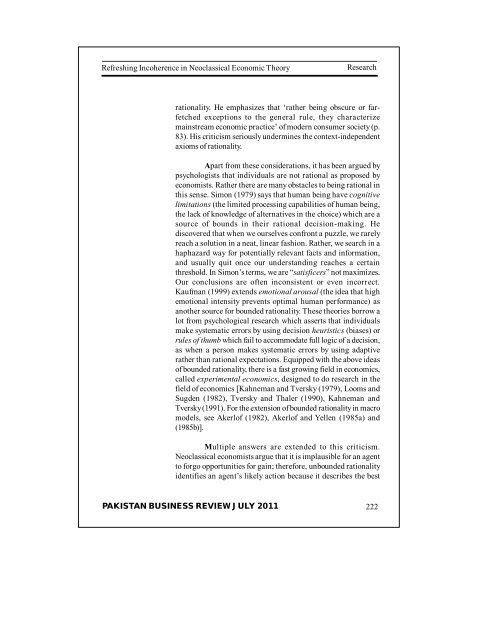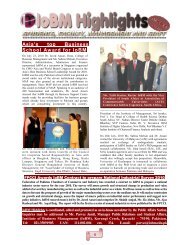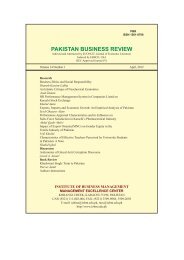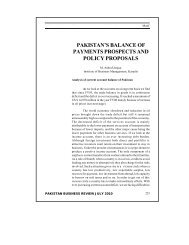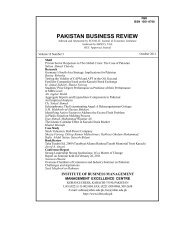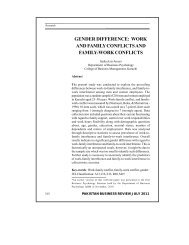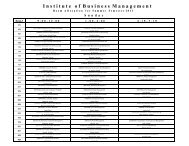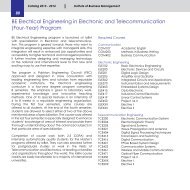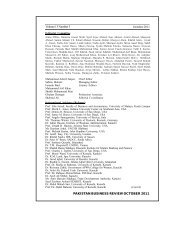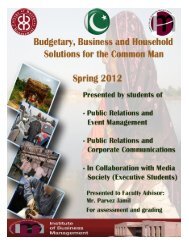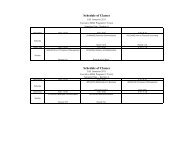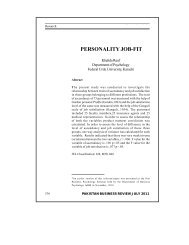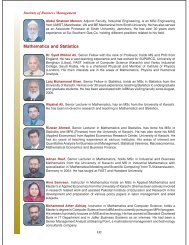PAKISTAN BUSINESS REVIEW - Institute of Business Management
PAKISTAN BUSINESS REVIEW - Institute of Business Management
PAKISTAN BUSINESS REVIEW - Institute of Business Management
Create successful ePaper yourself
Turn your PDF publications into a flip-book with our unique Google optimized e-Paper software.
Refreshing Incoherence in Neoclassical Economic Theory<br />
Research<br />
rationality. He emphasizes that ‘rather being obscure or farfetched<br />
exceptions to the general rule, they characterize<br />
mainstream economic practice’ <strong>of</strong> modern consumer society (p.<br />
83). His criticism seriously undermines the context-independent<br />
axioms <strong>of</strong> rationality.<br />
Apart from these considerations, it has been argued by<br />
psychologists that individuals are not rational as proposed by<br />
economists. Rather there are many obstacles to being rational in<br />
this sense. Simon (1979) says that human being have cognitive<br />
limitations (the limited processing capabilities <strong>of</strong> human being,<br />
the lack <strong>of</strong> knowledge <strong>of</strong> alternatives in the choice) which are a<br />
source <strong>of</strong> bounds in their rational decision-making. He<br />
discovered that when we ourselves confront a puzzle, we rarely<br />
reach a solution in a neat, linear fashion. Rather, we search in a<br />
haphazard way for potentially relevant facts and information,<br />
and usually quit once our understanding reaches a certain<br />
threshold. In Simon’s terms, we are “satisficers” not maximizes.<br />
Our conclusions are <strong>of</strong>ten inconsistent or even incorrect.<br />
Kaufman (1999) extends emotional arousal (the idea that high<br />
emotional intensity prevents optimal human performance) as<br />
another source for bounded rationality. These theories borrow a<br />
lot from psychological research which asserts that individuals<br />
make systematic errors by using decision heuristics (biases) or<br />
rules <strong>of</strong> thumb which fail to accommodate full logic <strong>of</strong> a decision,<br />
as when a person makes systematic errors by using adaptive<br />
rather than rational expectations. Equipped with the above ideas<br />
<strong>of</strong> bounded rationality, there is a fast growing field in economics,<br />
called experimental economics, designed to do research in the<br />
field <strong>of</strong> economics [Kahneman and Tversky (1979), Looms and<br />
Sugden (1982), Tversky and Thaler (1990), Kahneman and<br />
Tversky (1991). For the extension <strong>of</strong> bounded rationality in macro<br />
models, see Akerl<strong>of</strong> (1982), Akerl<strong>of</strong> and Yellen (1985a) and<br />
(1985b)].<br />
Multiple answers are extended to this criticism.<br />
Neoclassical economists argue that it is implausible for an agent<br />
to forgo opportunities for gain; therefore, unbounded rationality<br />
identifies an agent’s likely action because it describes the best<br />
<strong>PAKISTAN</strong> <strong>BUSINESS</strong> <strong>REVIEW</strong> JULY 2011<br />
222


